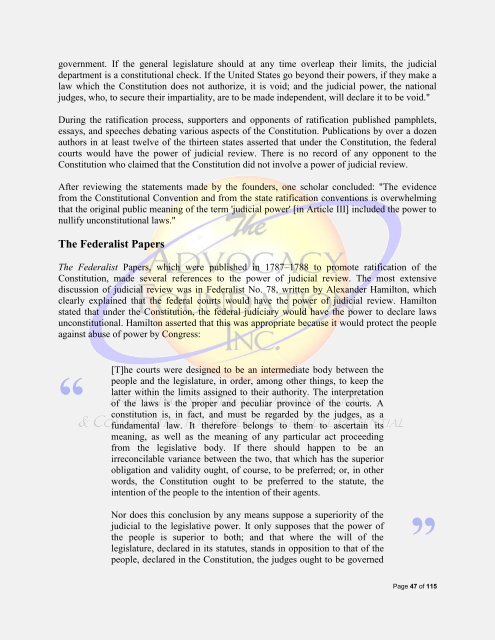Judicial ReEngineering
Judicial ReEngineering
Judicial ReEngineering
Create successful ePaper yourself
Turn your PDF publications into a flip-book with our unique Google optimized e-Paper software.
government. If the general legislature should at any time overleap their limits, the judicial<br />
department is a constitutional check. If the United States go beyond their powers, if they make a<br />
law which the Constitution does not authorize, it is void; and the judicial power, the national<br />
judges, who, to secure their impartiality, are to be made independent, will declare it to be void."<br />
During the ratification process, supporters and opponents of ratification published pamphlets,<br />
essays, and speeches debating various aspects of the Constitution. Publications by over a dozen<br />
authors in at least twelve of the thirteen states asserted that under the Constitution, the federal<br />
courts would have the power of judicial review. There is no record of any opponent to the<br />
Constitution who claimed that the Constitution did not involve a power of judicial review.<br />
After reviewing the statements made by the founders, one scholar concluded: "The evidence<br />
from the Constitutional Convention and from the state ratification conventions is overwhelming<br />
that the original public meaning of the term 'judicial power' [in Article III] included the power to<br />
nullify unconstitutional laws."<br />
The Federalist Papers<br />
The Federalist Papers, which were published in 1787–1788 to promote ratification of the<br />
Constitution, made several references to the power of judicial review. The most extensive<br />
discussion of judicial review was in Federalist No. 78, written by Alexander Hamilton, which<br />
clearly explained that the federal courts would have the power of judicial review. Hamilton<br />
stated that under the Constitution, the federal judiciary would have the power to declare laws<br />
unconstitutional. Hamilton asserted that this was appropriate because it would protect the people<br />
against abuse of power by Congress:<br />
“<br />
[T]he<br />
courts were designed to be an intermediate body between the<br />
people and the legislature, in order, among other things, to keep the<br />
latter within the limits assigned to their authority. The interpretation<br />
of the laws is the proper and peculiar province of the courts. A<br />
constitution is, in fact, and must be regarded by the judges, as a<br />
fundamental law. It therefore belongs to them to ascertain its<br />
meaning, as well as the meaning of any particular act proceeding<br />
from the legislative body. If there should happen to be an<br />
irreconcilable variance between the two, that which has the superior<br />
obligation and validity ought, of course, to be preferred; or, in other<br />
words, the Constitution ought to be preferred to the statute, the<br />
intention of the people to the intention of their agents.<br />
Nor does this conclusion by any means suppose a superiority of the<br />
judicial to the legislative power. It only supposes that the power of<br />
the people is superior to both; and that where the will of the<br />
legislature, declared in its statutes, stands in opposition to that of the<br />
people, declared in the Constitution, the judges ought to be governed<br />
”<br />
Page 47 of 115

















